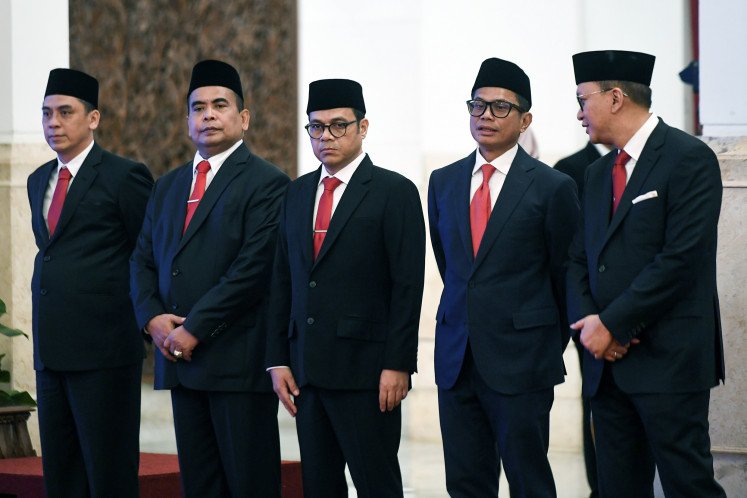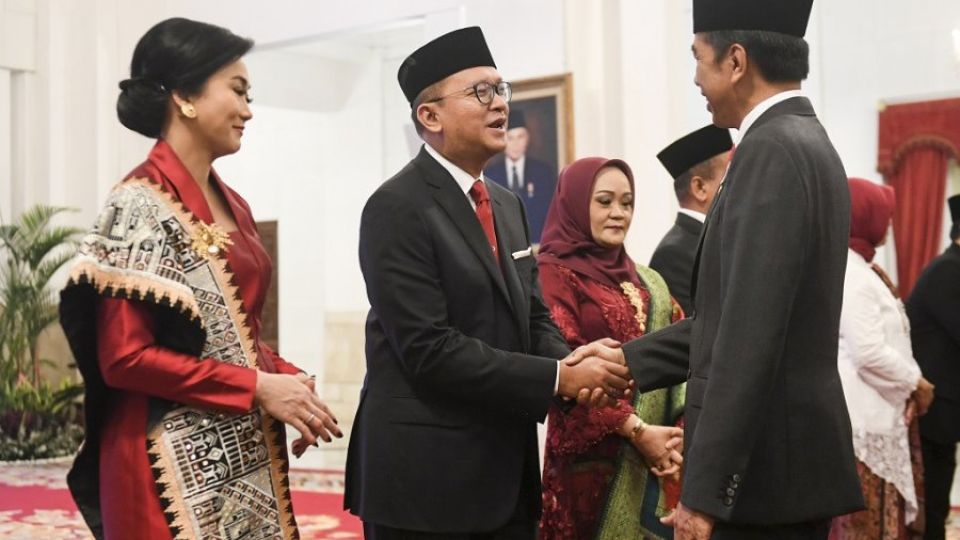July 20, 2023
JAKARTA – The recent Cabinet shake-up saw President Joko “Jokowi” Widodo double down on his distinct brand of economic diplomacy, albeit at the risk of neglecting some of the nation’s most strategically important bilateral ties.
This week saw the addition of a seasoned businessperson to the Foreign Ministry’s top roster, while two highly coveted ambassadorship posts, Washington, DC in the United States and Seoul in South Korea, have been vacated after Monday’s reshuffle.
Former deputy state-owned enterprises minister Pahala N. Mansury has been given the new task as deputy foreign ministry, while Rosan P. Roeslani left his post as the Indonesian ambassador to the US to fill Pahala’s old post at the SOE Ministry. Meanwhile, Gandi Sulistiyanto, the Indonesian envoy to South Korea since late 2021, also returned home to be appointed as a new member of the presidential advisory board (Wantimpres).
Jokowi, whose administration since 2014 has largely focused on economic development, has been seen to be taking advantage of Jakarta’s diplomatic relations to further his domestic ambitions. The President has deployed people from business and political backgrounds to a number of diplomatic posts, rather than following the Foreign Ministry’s preference of fielding career diplomats.
The President’s foreign policy so far remains centered on securing investment for Jokowi’s grand vision, among other plans, of elevating Indonesia to becoming a high-income country over the next two decades and the downstreaming of the country’s critical mineral industry.
Read also: ASEAN remains focused on economy
Deputy Minister Pahala, who is now second-in-command to two-term Foreign Minister Retno LP Marsudi, told reporters on Monday that Jokowi gave him the order to increase the country’s international trade and investments for the remainder of his tenure at the Jl. Pejambon.
“[Among my focuses] are enhancing trade and investments to address the future challenge of improving economic relations between our country and other nations, and how we can use our diplomatic experiences as an asset to kickstart new projects,” he was quoted as saying by kompas.com.
His inauguration was shortly followed by a meeting with Retno.
“Welcome to the big family of the Foreign Ministry,” Retno wrote on her official Twitter account. “Welcome to your new home, Pak.”
High turnover
For better or worse, President Jokowi’s emphasis on the economic side of things has often resulted in the ministry handing over some of its most crucial diplomatic posts to a revolving door of business-forward officials, observers say.
This predisposition exists against the backdrop of ever-intensifying geopolitical instability caused by conflict and acute competition between major powers, all of which require complex diplomatic management.
For the third time in a row, the Indonesian Embassy in Washington, DC, which has been regarded Jakarta’s most important foreign outpost, has been left without leadership.
Despite its high geopolitical and security value for Indonesia, the embassy has an unusually turnover rate. Prior to Rosan’s appointment as ambassador in 2021, Mahendra Siregar served for less than a year in 2019 before being recalled to serve as deputy foreign minister. He has since moved on to leading the Financial Services Authority (OJK).
Mahendra’s successor, Muhammad Lutfi, also served for less than a year in the US before Jokowi appointed him as trade minister in December 2020.

Deputy State-Owned Enterprises (SOE) Minister Rosan P. Roeslani (right) and Deputy Foreign Affairs Minister Pahala Mansury (second right) stand with other newly inaugurated deputy ministers during their inauguration at the State Palace in Jakarta on July 17, 2023. The new deputy ministers, including Deputy Communications and Information Minister Nezar Patria (center), Deputy Village, Disadvantaged Regions and Transmigration Minister Paiman Raharjo (second left) and deputy Religious Affairs Minister Saiful R. Dasuki (second left) were inaugurated by President Joko “Jokowi” Widodo roughly a year ahead of the end of his term. (Antara/Hafidz Mubarak A)
Rosan’s return from Washington coincides with Jakarta’s growing frustration with the US and its allies in its funding pledges for the Just Energy Transition Partnership (JETP), sparking questions of intent.
Coordinating Maritime and Investment Minister Luhut Pandjaitan conveyed his frustration over the US$20 billion pledge, saying he remains uninformed about the reasons behind the delayed disbursement despite Indonesia’s efforts to lay the adequate groundwork as part of the deal.
“If the loan will be priced similarly to a commercial loan then forget it. We can do it by ourselves,” Luhut said in June.
The high turnover is unusual compared with other countries, such as Singapore, whose ambassador to the US Ashok Mirpuri just left the post this year since first coming to Washington in 2012, said Aaron Connelly, an international relations expert from the International Institute for Strategic Studies (IISS).
Recalling an envoy before his or her term is complete is often considered a diplomatic snub. Officials have not made any comments on the matter. “I think Jokowi regards the US business community as a more important partner than the US government,” Connelly told The Jakarta Post.
But the high turnover for the envoy post in Washington might injure Indonesia’s foreign interests, including Jokowi’s own ambition for the economy.
“It is, simply put, a waste of human resources. This is injurious to Indonesia’s interests abroad,” said international relations expert Dewi Fortuna Anwar from the National Research and Innovation Agency (BRIN).
“If improving economic diplomacy is Jokowi’s priority, Indonesia’s diplomatic relationship with other countries must not be weakened by repeatedly withdrawing its ambassadors early,” she told the Post.
Read also: ‘We all should focus on economic diplomacy,’ Jokowi tells Indonesian envoys
Free and active?
Other observers emphasized the importance of other aspects of a free and active Indonesian foreign policy outside of the economy, with security and political aspects of diplomacy becoming more important than ever amid the global and regional conflicts.
“I think many in the Foreign Ministry hope that our policy doesn’t become too transactional,” said Dino Patti Djalal, who once served as deputy foreign minister and ambassador to the US.
“That is worrisome. Reducing everything to economic transactions is reducing Indonesia’s foreign policy.”
With the Indonesian post now empty in Washington, DC, the US Embassy in Jakarta has issued a statement saying that the US government was looking forward to working with the next ambassador.


